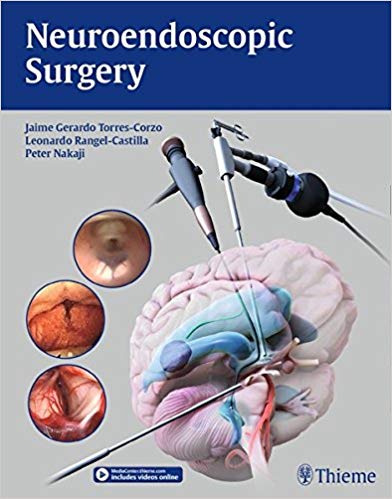
We wish to congratulate Drs. Torres-Corzo, Rangel-Castilla and Nakaji for their excellent work, which is expected to become a reference in this field. We highly recommend Neuroendoscopic Surgery and we have no doubts that it will prove to be useful among its readership of neurosurgical expertise and also among the whole scientific community. — Acta Neurochirugica
…the text and numerous accompanying videos provide an extremely comprehensive yet focused review of the ability of a neurosurgeon to use the endoscope to approach this subset of lesions….this text is a great book to have as a reference while one ponders the possibilities offered by neuroendoscopy for our patients. — Young Neurosurgeons News
Honorable mention from the 2017 PROSE Awards HONORABLE MENTION for Textbook/Clinical Medicine!
The development and refinement of neuroendoscopy has been driven by the persistent desire of neurosurgeons to advance the field and offer less invasive, more efficacious options to patients. This remarkable multimedia book reflects the technological advances achieved in the last two decades in fiber optics, cold light, cameras, and endoscopic instrumentation. Written by an impressive Who’s Who of international neurosurgeons, the outstanding text and videos reflect global contributions to neuroendoscopy.
Current indications for intracranial and intraventricular endoscopy are described in depth, through detailed chapters, stellar videos, professional animations, and exquisite illustrations. The authors share their clinical expertise on procedures ranging from endoscopic third ventriculostomy to transventricular approach of the fourth ventricle. Cover to cover, this book details the differences, alternatives, advantages, and limitations of the flexible neuroendoscope.
This hands-on learning tool will enable neurosurgeons to perform endoscopy of the ventricles and basal cisterns for exploratory purposes and conditions such as hydrocephalus, congenital aqueductal stenosis, tumors, hypothalamic hamartoma, arachnoid cysts, and neurocysticercosis. Additional topics include endoscopic-assisted microvascular decompression and aneurysm surgery, fluorescence, complications, anesthesia, utilization in developing countries, and future trends.
Key Features:
- Comprehensive multimedia reference with online access to 70 superb videos and animations
- More than 300 meticulously drawn illustrations
- Beautifully illustrated anatomical chapters that facilitate in-depth understanding of endoscopic anatomy
- An entire chapter devoted to flexible neuroendoscopy
- Indications, preoperative preparation, procedure description, intraoperative complications and their management ("risk and rescue: techniques), expert pearls, postoperative management, and outcomes
This volume is a must-have resource for neurosurgery and neurology residents, neurosurgeons, pediatric neurosurgeons, and all physicians involved in the care of patients with intracranial and intraventricular disease.

